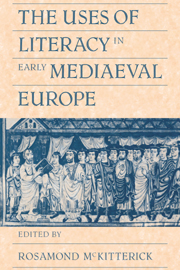Book contents
- Frontmatter
- Contents
- List of illustrations
- Contributors
- Preface
- Abbreviations
- Introduction
- 1 Literacy in Ireland: the evidence of the Patrick dossier in the Book of Armagh
- 2 Anglo-Saxon lay society and the written word
- 3 Administration, law and culture in Merovingian Gaul
- 4 Literacy and the papal government in late antiquity and the early middle ages
- 5 Literacy and the laity in early mediaeval Spain
- 6 Aspects of mediaeval Jewish literacy
- 7 Writing in early mediaeval Byzantium
- 8 Literacy displayed: the use of inscriptions at the monastery of San Vincenzo al Volturno in the early ninth century
- 9 Royal government and the written word in late Anglo-Saxon England
- 10 Literacy in Carolingian government
- 11 Text and image in the Carolingian world
- Conclusion
- Index
Conclusion
Published online by Cambridge University Press: 07 December 2009
- Frontmatter
- Contents
- List of illustrations
- Contributors
- Preface
- Abbreviations
- Introduction
- 1 Literacy in Ireland: the evidence of the Patrick dossier in the Book of Armagh
- 2 Anglo-Saxon lay society and the written word
- 3 Administration, law and culture in Merovingian Gaul
- 4 Literacy and the papal government in late antiquity and the early middle ages
- 5 Literacy and the laity in early mediaeval Spain
- 6 Aspects of mediaeval Jewish literacy
- 7 Writing in early mediaeval Byzantium
- 8 Literacy displayed: the use of inscriptions at the monastery of San Vincenzo al Volturno in the early ninth century
- 9 Royal government and the written word in late Anglo-Saxon England
- 10 Literacy in Carolingian government
- 11 Text and image in the Carolingian world
- Conclusion
- Index
Summary
It will be clear from the essays in this book that there were many uses of literacy in the early middle ages. There are, of course, more questions that need to be raised, arising in part out of the topics addressed in this book, as well as relating to the obvious areas left unexplored which we outlined in the introduction. We have tried to demonstrate how literacy, because it covers both the content of the written tradition and the levels of individual or collective achievement in it, must be discussed in terms of its diverse historical contexts if it is to be understood. It is, moreover, only on a selection of possible historical contexts that we have concentrated. Whether any general conclusions may be drawn from our particular examples has still to be considered. It may be useful here, therefore, to pull together some of the various threads unravelled in the course of our investigations in the foregoing chapters.
Two common themes have emerged, and these are relevant for any understanding of literacy in society generally. First, there is the intertwining of the symbolic function and practical uses of writing. Consideration of this theme underlines the importance of the second, namely, the possibilities of a complex interrelationship between writing and other elements of social and cultural practice.
Some papers, notably those of Kelly, Keynes, Nelson and Noble, focussed largely on the practical uses of writing. Others, particularly those of McKitterick, Mitchell and Mullett, placed greater emphasis on the various manifestations of the symbolic function of writing.
- Type
- Chapter
- Information
- The Uses of Literacy in Early Mediaeval Europe , pp. 319 - 333Publisher: Cambridge University PressPrint publication year: 1990
- 1
- Cited by



